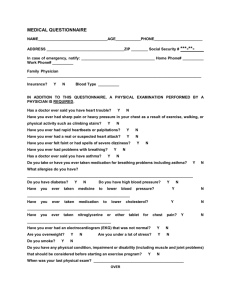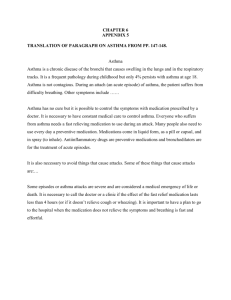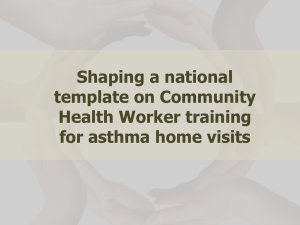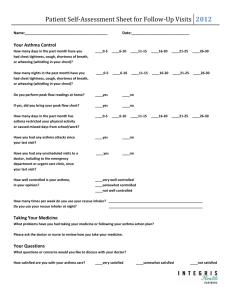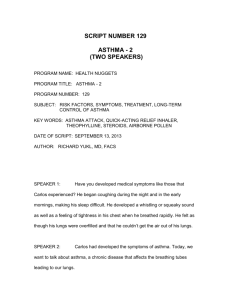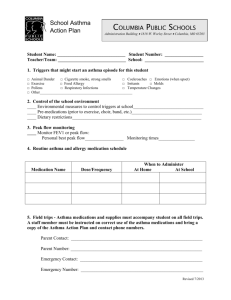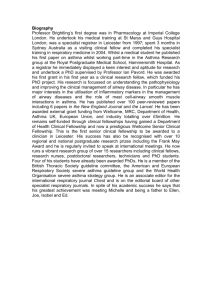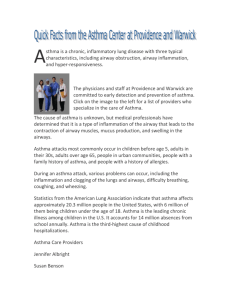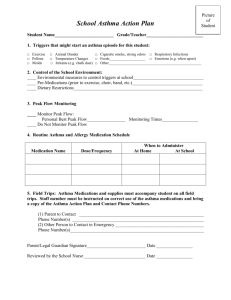script number 129 asthma
advertisement
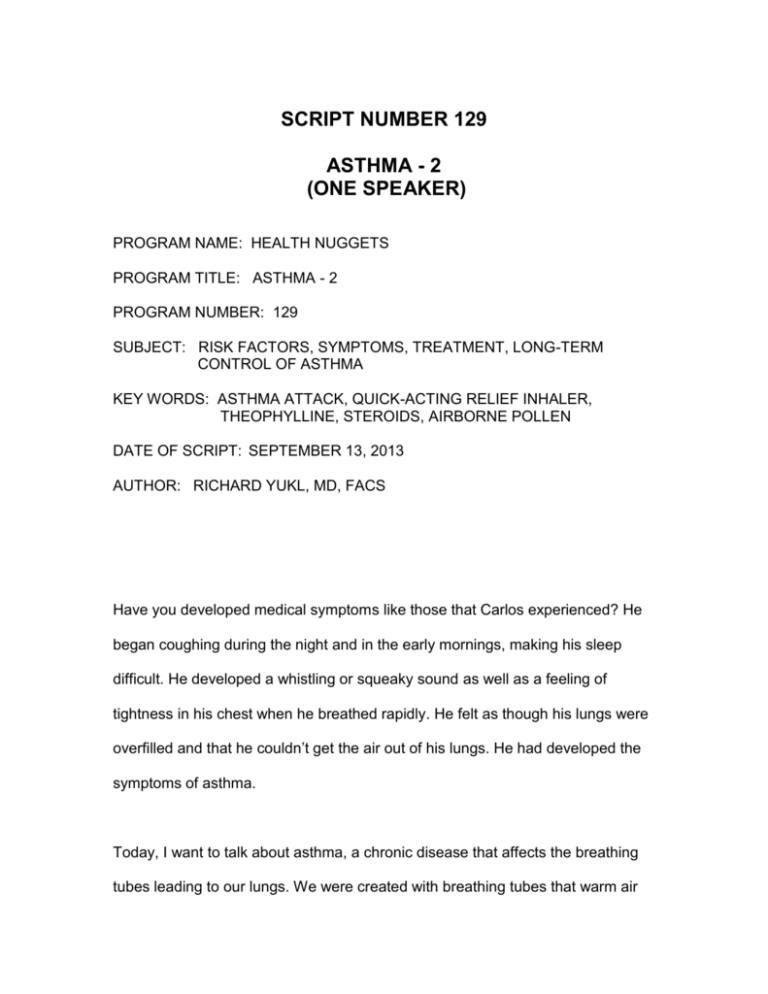
SCRIPT NUMBER 129 ASTHMA - 2 (ONE SPEAKER) PROGRAM NAME: HEALTH NUGGETS PROGRAM TITLE: ASTHMA - 2 PROGRAM NUMBER: 129 SUBJECT: RISK FACTORS, SYMPTOMS, TREATMENT, LONG-TERM CONTROL OF ASTHMA KEY WORDS: ASTHMA ATTACK, QUICK-ACTING RELIEF INHALER, THEOPHYLLINE, STEROIDS, AIRBORNE POLLEN DATE OF SCRIPT: SEPTEMBER 13, 2013 AUTHOR: RICHARD YUKL, MD, FACS Have you developed medical symptoms like those that Carlos experienced? He began coughing during the night and in the early mornings, making his sleep difficult. He developed a whistling or squeaky sound as well as a feeling of tightness in his chest when he breathed rapidly. He felt as though his lungs were overfilled and that he couldn’t get the air out of his lungs. He had developed the symptoms of asthma. Today, I want to talk about asthma, a chronic disease that affects the breathing tubes leading to our lungs. We were created with breathing tubes that warm air as it is brought into our lungs. Additionally, small hairs in the breathing tubes move in a coordinated, wave-like motion to help remove airborne debris. The hairs can also stimulate coughing to more effectively remove the debris. Specialized cells in the breathing tubes secrete mucus to form a sticky, protective coating on the inside surfaces of the tubes that traps harmful organisms and dust. In asthma, the lining cells of the breathing tubes become overly sensitive, reacting strongly to any irritating substance. The tubes become swollen and narrowed, significantly limiting the amount of air that can enter the lungs. Asthma is caused by a combination of genetic and other factors. Risk factors that will increase your chances of developing asthma include another member of your family with asthma, smoking or being heavily exposed to someone who smokes, having allergies such as hay fever, having a mother who smoked while pregnant and obesity. Symptoms of asthma come in episodes called asthma attacks, and they are just as Carlos experienced - coughing, especially at night and in the early mornings, wheezing and shortness of breath. For some people, these symptoms are only a minor nuisance, but for others they become a major and even life-threatening health problem. During an asthma attack, swelling can so narrow the breathing tubes that the lungs cannot get enough oxygen to support proper bodily functions. Attacks can be triggered by vigorous, sustained exercise, especially exercise in cold weather, by exposure to irritating gases or chemical fumes, by dust, or by triggering allergies such as airborne pollen or pet hair. Strong emotions and stress can also trigger an attack in some people. Diagnosis can be difficult because the symptoms can vary widely in type and severity from one person to another. A doctor will make the diagnosis by measuring how much air you can breathe out with maximum effort after a deep breath. Asthma cannot be cured, but proper treatment can effectively control its symptoms. Treatment requires learning to recognize and to avoid the triggers to which you react. Medicines can help reduce the swelling that leads to attacks, and quick-acting relief inhalers can rapidly open swollen breathing tubes during an attack. They act within minutes of being inhaled, and their effect lasts for several hours. Long-term control, however, is the key to successful management. In most cases, achieving long-term control will require that you take some medicines every day - medicines such as steroids that you inhale. They are prescribed by your doctor. Your doctor may also prescribe pills called theophyllines. You take these theophylline pills by mouth every day, and they relax the muscles surrounding your breathing tubes, making your breathing easier. The symptoms Carlos experienced cleared completely once he learned to wear a mask to avoid breathing in heavy dust at work, and his doctor started him on theophyllines. Many people with asthma rely on medicines alone to prevent and relieve their symptoms, but you can also make lifestyle changes to further lessen the likelihood of suffering attacks. Like Carlos, you can reduce your exposure to the things that trigger your attacks. You might use an air conditioner to reduce the amount of airborne pollens from trees, grasses and weeds that come into your home. If you don’t have air conditioning, you can keep your windows closed during pollen season. Cover your pillows and mattress with dust-proof covers, and clean your home at least once a week to minimize the dust, wearing a mask while you clean. You can also install washable curtains and blinds, and if possible, remove the carpeting, installing hardwood or linoleum flooring. Being overweight worsens asthma symptoms, so get back to your ideal weight. Eat plenty of fruits and vegetables, as these foods are rich in antioxidants, which boost your immune system and reduce asthma symptoms. Lessen your anxiety and the feelings of helplessness about your situation by focusing on the things you can do, not the things you can’t do. Finally, taking care of your health by getting regular exercise helps. Exercise strengthens your heart and lungs, and that will help relieve asthma symptoms. Exercise involving long periods of exertion such as long distance running or basketball is poorly tolerated by asthmatics, but exercise that involves short, intermittent periods of exertion such as volleyball or baseball is generally well tolerated. To summarize, long-term control is the key to managing asthma. Medicines are essential for long-term control, so, like Carlos, take your medicines exactly as your doctor prescribed them. Identify your asthma triggers by carefully noting the things that trigger your attacks, and avoid those situations. Learn to recognize the signs that you are developing an attack, and act quickly to treat it. Write down a detailed plan for managing an attack once it begins to occur. Develop an understanding of the plan and act quickly to treat the attack. If you act quickly, you will lessen the likelihood that the attack will be severe. If you find yourself relying on your quick-relief inhaler more frequently with time, your disease isn’t under control, so see your doctor about adjusting your medicines or treatment plan. Health Nuggets is written by Dr. Richard Yukl, a medical doctor working in the United States. The medical views expressed in this program are his and may differ for your particular health needs. If you need medical advice, please consult a medical professional in your area.
